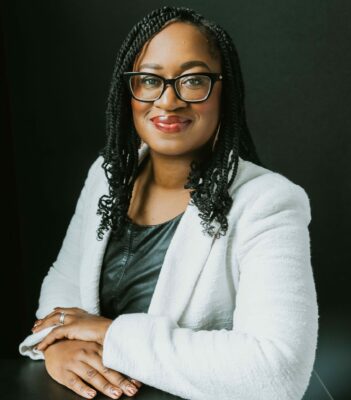We are so excited for the USIH conference later this year! Based on the theme “Knowledge and Belief,” the conference will take place in Boston on November 14-16 at the Boston Sheraton. The deadline for panel and paper submissions is April 15, and you can find the CFP at this link. While we assume everyone is busy planning their proposals, we thought we’d whet your appetite with a few updates.
First, we are thrilled to announce that our keynote speaker will be Dr. Keisha Blain, professor of Africana Studies and History at Brown University. Here is a quick biography:
 Keisha N. Blain, a 2022 Guggenheim Fellow and Class of 2022 Carnegie Fellow, is one of the most innovative and influential young historians of her generation. She is an award-winning historian of the 20th century United States with broad interests and specializations in African American History, the modern African Diaspora, and Women’s and Gender Studies. She completed a Ph.D. in History from Princeton University and is now a Professor of Africana Studies and History at Brown University. Blain is the author of the highly acclaimed books Set the World on Fire: Black Nationalist Women and the Global Struggle for Freedom (University of Pennsylvania Press, 2018) and Until I am Free: Fannie Lou Hamer’s Enduring Message to America (Beacon Press, 2021). She has also edited four collections, including the #1 New York Times Bestseller Four Hundred Souls: A Community History of African America, 1619–2019 (with Ibram X. Kendi). Blain’s latest book, Wake Up America: Black Women on the Future of Democracy (W.W. Norton, 2024), brings together the voices of major progressive Black women politicians, grassroots activists, and intellectuals to offer critical insights on how we can create a more equitable political future.
Keisha N. Blain, a 2022 Guggenheim Fellow and Class of 2022 Carnegie Fellow, is one of the most innovative and influential young historians of her generation. She is an award-winning historian of the 20th century United States with broad interests and specializations in African American History, the modern African Diaspora, and Women’s and Gender Studies. She completed a Ph.D. in History from Princeton University and is now a Professor of Africana Studies and History at Brown University. Blain is the author of the highly acclaimed books Set the World on Fire: Black Nationalist Women and the Global Struggle for Freedom (University of Pennsylvania Press, 2018) and Until I am Free: Fannie Lou Hamer’s Enduring Message to America (Beacon Press, 2021). She has also edited four collections, including the #1 New York Times Bestseller Four Hundred Souls: A Community History of African America, 1619–2019 (with Ibram X. Kendi). Blain’s latest book, Wake Up America: Black Women on the Future of Democracy (W.W. Norton, 2024), brings together the voices of major progressive Black women politicians, grassroots activists, and intellectuals to offer critical insights on how we can create a more equitable political future.
Her keynote paper will be titled “Fannie Lou Hamer & the Power of Belief.”
We are also planning two plenary panels that reflect the conference theme and address key questions in intellectual history. One will examine the concept of “religious lives” with historians who are working on particular historical figures and their relationship to spiritual and secular sources of truth, and another will consider “imaged spaces” as a framework to interpret past worlds and the people who inhabited them. More details on these panels will be forthcoming.
Finally, we are honored to share the distinguished cast of scholars who will be serving on the program committee with us. They are the following:
Ethan Goodnight, Harvard University
Lauren Lassabe Shepherd, University of New Orleans
Tara Strauch, Centre College
Dan Vaca, Brown University
Kyle Volk, University of Montana
You can rest assured the program will be in good hands.
As a reminder, paper and panel proposals are due on April 15, and you can find instructions on how to submit at the CFP page. We look forward to seeing your proposals, and are even more excited to see you in Boston!
Emily Conroy-Krutz, co-chair
Benjamin E. Park, co-chair

0